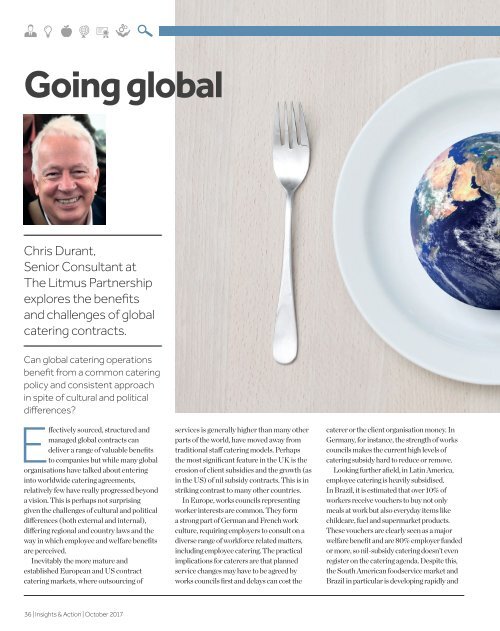EP Insights & Action
Expert observers comment on the Industry. This magazine is designed to bring together the thought leadership, ideas and opinions of leading consultants and operators from across the industry. EP's vision is to create an open narrative and debate that explains the perspective and thinking on the market and Industry. It will help all progress, so let us know your thoughts, subscribe and be involved.
Expert observers comment on the Industry. This magazine is designed to bring together the thought leadership, ideas and opinions of leading consultants and operators from across the industry. EP's vision is to create an open narrative and debate that explains the perspective and thinking on the market and Industry. It will help all progress, so let us know your thoughts, subscribe and be involved.
Create successful ePaper yourself
Turn your PDF publications into a flip-book with our unique Google optimized e-Paper software.
Going global<br />
Chris Durant,<br />
Senior Consultant at<br />
The Litmus Partnership<br />
explores the benefits<br />
and challenges of global<br />
catering contracts.<br />
Can global catering operations<br />
benefit from a common catering<br />
policy and consistent approach<br />
in spite of cultural and political<br />
differences?<br />
Effectively sourced, structured and<br />
managed global contracts can<br />
deliver a range of valuable benefits<br />
to companies but while many global<br />
organisations have talked about entering<br />
into worldwide catering agreements,<br />
relatively few have really progressed beyond<br />
a vision. This is perhaps not surprising<br />
given the challenges of cultural and political<br />
differences (both external and internal),<br />
differing regional and country laws and the<br />
way in which employee and welfare benefits<br />
are perceived.<br />
Inevitably the more mature and<br />
established European and US contract<br />
catering markets, where outsourcing of<br />
services is generally higher than many other<br />
parts of the world, have moved away from<br />
traditional staff catering models. Perhaps<br />
the most significant feature in the UK is the<br />
erosion of client subsidies and the growth (as<br />
in the US) of nil subsidy contracts. This is in<br />
striking contrast to many other countries.<br />
In Europe, works councils representing<br />
worker interests are common. They form<br />
a strong part of German and French work<br />
culture, requiring employers to consult on a<br />
diverse range of workforce related matters,<br />
including employee catering. The practical<br />
implications for caterers are that planned<br />
service changes may have to be agreed by<br />
works councils first and delays can cost the<br />
caterer or the client organisation money. In<br />
Germany, for instance, the strength of works<br />
councils makes the current high levels of<br />
catering subsidy hard to reduce or remove.<br />
Looking further afield, in Latin America,<br />
employee catering is heavily subsidised.<br />
In Brazil, it is estimated that over 10% of<br />
workers receive vouchers to buy not only<br />
meals at work but also everyday items like<br />
childcare, fuel and supermarket products.<br />
These vouchers are clearly seen as a major<br />
welfare benefit and are 80% employer funded<br />
or more, so nil-subsidy catering doesn’t even<br />
register on the catering agenda. Despite this,<br />
the South American foodservice market and<br />
Brazil in particular is developing rapidly and<br />
36 | <strong>Insights</strong> & <strong>Action</strong> | October 2017
















